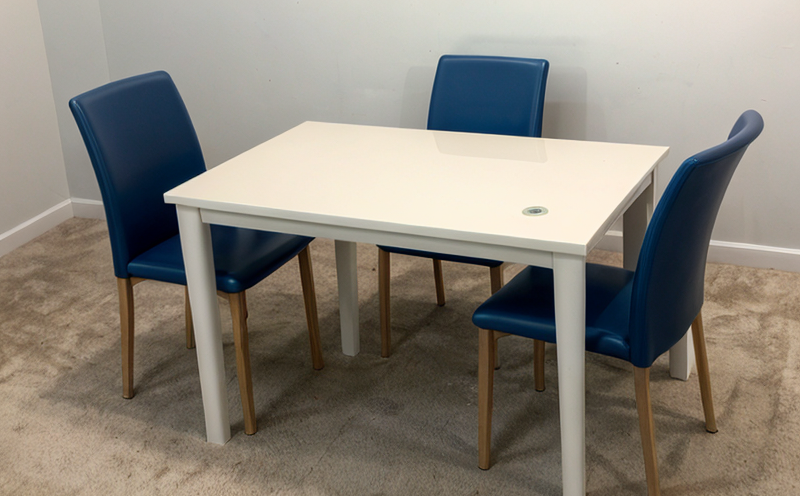UL 746A Polymeric Material Safety Testing for Furniture Plastics
The UL 746A standard is a vital component of ensuring safety in the production and use of furniture plastics. This standard requires that polymeric materials used in furniture undergo rigorous testing to ensure they meet stringent flammability, smoke density, and toxicity criteria. The test is particularly important for materials that come into direct contact with humans or are exposed to flame sources.
The UL 746A test involves exposing the plastic specimens to a specific heat source under controlled conditions. This process simulates real-world scenarios where furniture plastics might be subjected to fire hazards, such as in a home setting. The primary goal is to determine whether the material will ignite and if it produces hazardous smoke or toxic gases when exposed.
Materials that pass this test are classified according to their performance into different categories defined by UL 746A. These classifications provide manufacturers with clear guidelines on how the materials can be used in furniture items, ensuring both safety and compliance with regulations.
The testing procedure is meticulously detailed within the standard itself. It specifies precise conditions for specimen preparation, such as dimensions and surface finish, to ensure that all tests are conducted under consistent conditions. This consistency is crucial for obtaining reliable results that can be compared across different samples and laboratories.
The UL 746A test is not only a regulatory requirement but also an essential tool for quality assurance in the furniture industry. It helps manufacturers identify potential issues early in the development process, allowing them to make necessary adjustments before products reach the market. This proactive approach ensures that consumers are protected from potentially dangerous materials and that businesses comply with international safety standards.
UL 746A testing is widely recognized for its reliability and consistency. It is often used as a benchmark by other organizations and governments, further emphasizing its importance in global manufacturing and trade. By adhering to this standard, manufacturers can gain competitive advantages in the market, ensuring that their products meet or exceed industry expectations.
Understanding the nuances of UL 746A testing requires expertise in material science and fire safety engineering. This knowledge is critical for those involved in quality management, compliance officers, R&D engineers, and procurement specialists who are responsible for sourcing materials and ensuring product safety.
Scope and Methodology
| Test Parameters | Description |
|---|---|
| Specimen Preparation | The specimens must be cut to specific dimensions, typically 100 mm x 50 mm x 3.2 mm for UL 746A testing. |
| Heat Source | A cone calorimeter is used to simulate fire conditions with a specified heat flux and duration. |
| Flame Spread Index (FSI) | The FSI measures the speed at which flame spreads across the specimen. |
| Smoke Density | The amount of smoke produced during testing is measured using a photoelectric smoke detector. |
The UL 746A test follows a series of steps to evaluate the material's performance. The specimens are prepared according to specified dimensions and then placed in a calorimeter where they are exposed to a controlled heat source for a set duration. During this time, various parameters such as flame spread index (FSI) and smoke density are continuously monitored.
After exposure, the specimens are analyzed to determine their compliance with UL 746A standards. This includes assessing whether the material has passed or failed based on its performance metrics. Compliance is critical for manufacturers who must ensure that all products meet regulatory requirements before they can be sold.
Industry Applications
- Furniture manufacturing: Ensuring safety and compliance with international regulations.
- Consumer goods: Providing safer products for end-users.
- R&D: Identifying potential improvements in material properties.
- Compliance: Meeting strict regulatory standards globally.
- Sourcing: Evaluating suppliers based on their adherence to safety standards.
The UL 746A test is widely used across various industries, particularly those involving polymeric materials. Furniture manufacturers rely heavily on this testing method to ensure that the plastics they use are safe and comply with international safety regulations. This not only protects consumers but also helps companies maintain a strong reputation for quality.
In research and development (R&D), UL 746A testing plays a crucial role in identifying areas where materials can be improved. By understanding how different factors affect the performance of polymeric materials, researchers are better equipped to innovate and develop safer products.
Compliance is another key application of this test. With strict regulations governing the use of plastics in furniture manufacturing, companies must ensure that their products meet these standards before they can be sold on the market. UL 746A testing provides a reliable way to verify compliance with international safety guidelines.
Customer Impact and Satisfaction
- Safety: Ensures that furniture plastics do not pose fire hazards or produce harmful smoke.
- Quality: Provides consistent and reliable performance of materials across different products.
- Reputation: Enhances the reputation of manufacturers by demonstrating commitment to safety standards.
- Cost-effectiveness: Early identification of potential issues can save costs associated with product recalls.
The UL 746A test has a significant impact on customer satisfaction and trust. By ensuring that furniture plastics meet strict safety standards, it provides peace of mind for consumers who are concerned about their family's well-being. This confidence fosters stronger relationships between manufacturers and customers.
Manufacturers benefit from the cost-effectiveness of early identification of issues through UL 746A testing. By catching potential problems early in the development process, companies can avoid costly recalls and product replacements later on. This proactive approach not only saves money but also strengthens brand loyalty among consumers who appreciate safe products.





